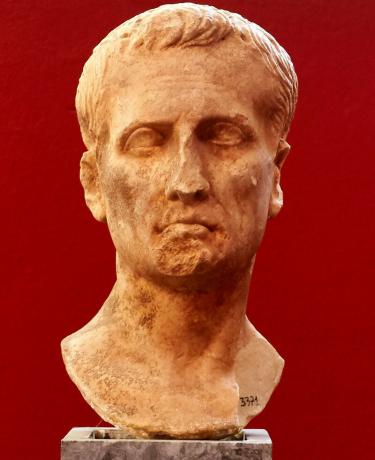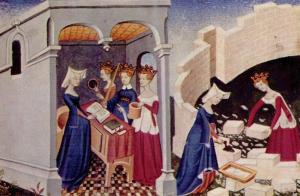Julius Caesar: biography of this soldier and politician of Ancient Rome
We are in the ides of March of the year 44 a. c. That day, as usual, Gaius Julius Caesar addresses the Senate. Just a few months ago he proclaimed himself dictator, that is, dictator of Rome, which sweeps away all the republican tradition that the city had preserved for centuries. For some, Caesar's ambition has gone too far...
What happened that March 15 is well known; César was stabbed on the steps, the victim of a plot against him. But what had brought this man to such an end? Who was Julius Caesar? How did he become a dictator?
Brief biography of Julius Caesar
In this biography of Julius Caesar, we will take a tour of the life of one of the most famous characters of ancient Rome, who put the Republic in check and changed the course of Roman history.
From a patrician family, but come to less
Caesar's origins could not be more honorable: he was born into the Iulia or Julia gens, one of the oldest clans in Rome. The Roman clans, which sunk their roots in the founders of the city, formed the patrician or aristocratic class, which shared, as is logical, the power of the Republic. Thus, forming alliances between these
genes, especially through marriage, was crucial to surviving politically (and often literally) in the complex web of conspiracies that made up Roman reality.Gaius Julius Caesar was born on the 12th or 13th day of the month of Quintilius in the year 100 BC. c. At least, that is the date accepted by most historians. Much later, when he was already a famous man, Caesar himself changed the name of the month, replacing it with "July", in honor, of course, of himself.
Despite his noble origins, the Julia family he lived in one of the poorest neighborhoods of the city, the Suburra. It was probably these humble origins that forged the ideology of the young Caesar, which aligned him later with the populares, the Roman political faction that supported the mob against the oligarchy aristocratic.
His mother, Aurelia, was always a point of support for young Julio, and tried to protect him from all setbacks. However, César was a restless boy who soon followed in the political footsteps of his uncle, Cayo Mario.. Also a supporter of the populares, Mario was immersed in a radical antagonism with his political rival, Lucio Cornelio Sulla; antagonism that, in the end, ended up triggering the first civil war of the Roman Republic.
- Related article: "The 3 stages of Ancient Rome: its history and its characteristics"
Exile and triumphant return
In the year 81 a. C., Sulla becomes dictator and begins a fierce persecution of the supporters of the exiled Mario, which includes the young César. The boy, then barely 20 years old, he is forced to flee Rome and enlist in the army, in which he achieves great successes and from which he returns wearing the "civic crown", an important military distinction.
Indeed, in 78 a. C., Lucio Cornelio Sulla had already died. César therefore settles in Rome and begins to practice as a lawyer, again with tremendous success. The excellent instruction he received in his early years, along with his extraordinary oratorical ability, make him a tremendously popular character. Caesar is adored by the mob.
By then, his first wife, Cornelia, had passed away. Caesar remarries Pompeii, who is, by the way, granddaughter of the late Sulla. Then began a brilliant political career that led him to hold various positions in the Republic, until, in 63 B.C. C., is named Pontiff Maximus. César is 37 years old and still has a lot of ambition to satisfy.
- You may be interested in: "The 5 ages of History (and their characteristics)"
The first triumvirate and the Gallic Wars
In 62 B.C. C., Caesar divorces Pompeii; In principle, because of the scandal that his adulterous relationship with another man has caused. Not only that; as wife of Pontiff Maximus, Pompeii should organize the celebrations in honor of the Bona Dea, in which male participation was not allowed.
Rumor soon spreads that a young man has gotten into the house and lain with Pompeii (which was probably just that, a rumour). César's response is an immediate divorce order. The writer Plutarch, in his famous work Parallel lives, he collects some supposed words from César about the event, in which he said that his wife should not only be honored, but also appear to be.

In a world where links were mere political alliances, not surprisingly, shortly after the divorce, Caesar remarried; this time with Calpurnia, the daughter of Senator Lucio Cornelio Piso. At the same time, he marries his daughter Julia, by his first wife, to Gnaeus Pompey the Great, his political ally. It is precisely with Pompey and with Marco Licinio Crasso with whom, in 60 a. C., establishes what will be the first triumvirate of Rome.
At that time he also left for Hispania as governor. But probably the most famous campaign and the one for which he is best known is the campaign in Gaul, of which Caesar himself left written testimony in his work The Gallic War. With the excuse of keeping the Helvetii, who were trespassing the Roman limits, at bay, Caesar led his legions into Gallic territory.. The campaign lasted no less than seven years, during which he managed to subdue not only the Gauls, but also the Belgians. In 52 B.C. C., the battle of Alesia takes place, in which the last Gallic leader, Vercingétorix, is defeated.
- Related article: "Top 10 Most Important Roman Goddesses"
A new civil war
While in Gaul, his former allies conspire against him in Rome. Crassus, the third man of the triumvirate, has died in the war against the Parthians. In Rome remains Pompey, who is not at all satisfied with the reforms proposed by Caesar, in line with his popular ideology. Pompey allies himself, then, with the optimizes, the opposing faction that supports the old traditions of the Republic and the control of the nobles. Caesar is a very troublesome individual, and his ideas go against Roman customs.. Also, he is incredibly popular. In a word: Caesar is dangerous.
In 49 a. C., Julius Caesar receives the order to return to Rome. He knows what this means; They intend to arrest him and judge him. He urges to make a decision. If he crosses the border alone and heads to Rome as a citizen, his fate is sealed. If he crosses it with his legions, the action will be taken by the Senate as a declaration of war. It is then when, according to tradition, César utters the famous phrase: Alea jacta est, "the dice are cast" or, what would come to the same thing, "the die is cast". Caesar crosses the Rubicon River with his troops and enters Rome. It is the beginning of a second civil war, which will last four years.
The End: The Ides of March
In August of the year 48 a. c. the battle of Farsalia takes place, which results in the defeat of Pompey and his allies. Caesar's former friend then flees to Egypt, where he tries to enlist the support of Pharaoh Ptolemy XIII. However, his attempt ends in tragedy; Pompey is killed by Ptolemy's supporters and his head sent to Caesar as a gift. But if the assassins were hoping to curry favor with him, they were sorely mistaken. Filled with fury at the undignified death that had been inflicted on his former companion, Caesar commands to execute the perpetrators of the crime.
Caesar had been in Egypt since the month of September, where he had disembarked to follow in the footsteps of his enemy. It is during this period that he begins a passionate relationship with Cleopatra, who is in full contention for the throne against her brother Ptolemy, and with whom he has her son Caesarion. The romance transcended history and has been the basis for numerous literary, cinematographic and artistic works.
On his return from Egypt, in 45 a. C., Caesar is the absolute owner of Rome. He begins to behave like a true king, which increases the suspicion of his many enemies. The old republicans fear the return of the monarchy, and Caesar is a serious threat in this regard. Thus, a plot is configured to assassinate the dictator, of which some of the figures are part. of the moment: Cayo Casio, Marco Licinio Bruto, Lucio Tulio Cimbrio and Servio Sulpicio Galba, among others. Although not all names could be retrieved, It is estimated that some sixty people were inside the conspiracy, whose group called itself liberators (“Liberators”), for they were convinced that they were ridding Rome of a tyrant.
According to Plutarch in his Lives, an augur had warned Caesar of the danger that threatened him, but he ignored the warning. After being stabbed, Caesar fell in the middle of a pool of blood, at the feet of the statue of Pompey, which was considered a symbol. It seemed that the defeated enemy had returned from the underworld to take revenge. It was the Ides of March in the year 44 B.C. c. or, what is the same, on March 15. Caesar died and, with him, the old Republic. Because his death did nothing more than trigger another stage of struggles and conflicts that ended with the accession to the throne of his adoptive son Octavio Augusto, the first emperor of Rome.


